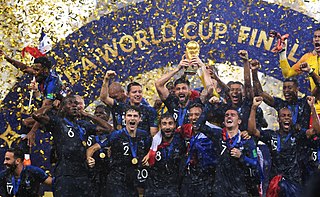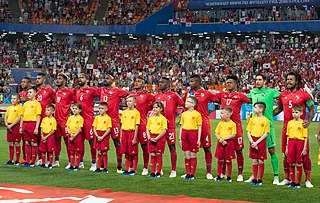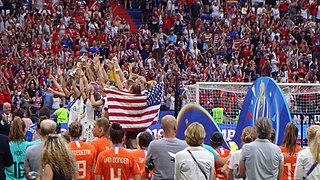
The 2002 FIFA World Cup, also branded as Korea Japan 2002, was the 17th FIFA World Cup, the quadrennial football world championship for men's national teams organized by FIFA. It was held from 31 May to 30 June 2002 at sites in South Korea and Japan, with its final match hosted by Japan at International Stadium in Yokohama.

The 2018 FIFA World Cup was the 21st FIFA World Cup, the quadrennial world championship for men's national football teams organized by FIFA. It took place in Russia from 14 June to 15 July 2018, after the country was awarded the hosting rights in 2010. It was the eleventh time the championships had been held in Europe, and the first time they were held in Eastern Europe. At an estimated cost of over $14.2 billion, it was the most expensive World Cup ever held until it was surpassed by the 2022 World Cup in Qatar.

The FIFA World Cup is an international association football competition contested by the men's national teams of the members of Fédération Internationale de Football Association (FIFA), the sport's global governing body. The championship has been awarded every four years since the first tournament in 1930, except in 1942 and 1946, due to World War II.

This article summarises the results and overall performances of Australia at the FIFA World Cup.

The 2015 FIFA Women's World Cup was the seventh FIFA Women's World Cup, the quadrennial international soccer championship contested by the women's national teams of the member associations of FIFA. The tournament was hosted by Canada for the first time and by a North American country for the third time. Matches were played in six cities across Canada in five time zones. The tournament began on 6 June 2015, and finished with the final on 5 July 2015 with a United States victory over Japan.
This is a record of Colombia's results at the FIFA World Cup. The FIFA World Cup is an international association football competition contested by the men's national teams of the members of Fédération Internationale de Football Association (FIFA), the sport's global governing body. The championship has been awarded every four years since the first tournament in 1930, except in 1942 and 1946, due to World War II.

This is a record of France's results at the FIFA World Cup. France was one of the four European teams that participated at the inaugural World Cup in
Group E of the 2015 FIFA Women's World Cup consisted of Brazil, South Korea, Spain and Costa Rica. Matches were played from 9 to 17 June 2015.
The knockout stage of the 2018 FIFA World Cup was the second and final stage of the competition, following the group stage. It began on 30 June with the round of 16 and ended on 15 July with the final match, held at the Luzhniki Stadium in Moscow. The top two teams from each group advanced to the knockout stage to compete in a single-elimination style tournament. A third place play-off was also played between the two losing teams of the semi-finals.

Panama has qualified once for the World Cup FIFA World Cup, the 2018 edition. They directly qualified after securing the third spot in the hexagonal on the final round. This meant that after 10 failed qualification campaigns, Panama appeared at the World Cup for the first time in their history.

Group C of the 2018 FIFA World Cup took place from 16 to 26 June 2018. The group consisted of France, Australia, Peru and Denmark. The top two teams, France and Denmark, advanced to the round of 16. France would go on to win the tournament.

Group D of the 2018 FIFA World Cup took place from 16 to 26 June 2018. The group consisted of Argentina, Iceland, Croatia, and Nigeria. The top two teams, Croatia and Argentina, advanced to the round of 16.

Group E of the 2018 FIFA World Cup took place from 17 to 27 June 2018. The group consisted of Brazil, Switzerland, Costa Rica, and Serbia. The top two teams, Brazil and Switzerland, advanced to the round of 16.

Group F of the 2018 FIFA World Cup took place from 17 to 27 June 2018. The group consisted of Germany, Mexico, Sweden, and South Korea. Sweden and Mexico were the top two teams that advanced to the round of 16. The incumbent World Cup champions, Germany, placed last, making it the first time since 1938 that Germany did not advance beyond the first round, and the first time ever, the group stage. The early German exit was "greeted with shock in newspapers around the world".

Group H of the 2018 FIFA World Cup took place from 19 to 28 June 2018. The group consisted of Poland, Senegal, Colombia, and Japan. The top two teams, Colombia and Japan, advanced to the round of 16. For the first time in World Cup history, the "fair play" rule was invoked to break a tie. Japan and Senegal finished with identical scores and goal differences to tie for second behind Colombia. Japan were awarded the place in the round of 16 based on receiving fewer yellow cards in their three matches.
The 2018 FIFA World Cup was an international men's football tournament, that took place between 14 June and 15 July 2018 in Russia. The competition was structured in the typical round-robin style during the initial group stages, with the top two teams of each group qualifying to the further stages. France and Croatia went to the finals and fought for the championship.

The United States women's national soccer team is the most successful women's national team in the history of the Women's World Cup, having won four titles, earning second-place once and third-place finishes three times. The United States is one of the countries besides Germany, Japan, and Norway to win a FIFA Women's World Cup. The United States are also the only team that has played the maximum number of matches possible in every tournament.

The Brazil women's national football team has represented Brazil at the FIFA Women's World Cup on eight occasions in 1991, 1995, 1999, 2003, 2007, 2011, 2015 and 2019. They were runners-up once. They also reached the third place once.
The South Korea women's national football team has represented South Korea at the FIFA Women's World Cup on three occasions, in 2003, 2015, and 2019.
The Costa Rica women's national football team has represented Costa Rica at the FIFA Women's World Cup on one occasion, in 2015.




















